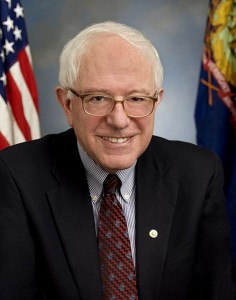 As trade negotiators meet in Malaysia for further talks on the Trans Pacific Partnership, a number of reports and statements have been released on the impact of the intellectual property provisions proposed by the United States. Some critics focus on the impact that the U.S. proposals may have on access to medicines and the functioning of the internet, others describe the effect of the IP provisions on access to copyrighted works and the functioning of the internet.
As trade negotiators meet in Malaysia for further talks on the Trans Pacific Partnership, a number of reports and statements have been released on the impact of the intellectual property provisions proposed by the United States. Some critics focus on the impact that the U.S. proposals may have on access to medicines and the functioning of the internet, others describe the effect of the IP provisions on access to copyrighted works and the functioning of the internet.
Sen. Sanders wrote USTR Ron Kirk to voice his “strong objection to the apparent reversal of United States trade policy during negotiations on the Trans Pacific Partnership Agreement with respect to ensuring access to medicines for our developing country trade partners.” He asked that the “May 10” 2007 policy compromise on data exclusivity and patent term extensions be incorporated into the IP chapter. He said other principles be incorporated into the TPP agreement – TRIPS flexibilities should apply to all diseases and medical conditions; TPP should reflect different levels of development in negotiating countries; patent provisions should not require the patenting of “new forms of old products without increase in therapeutic efficacy”; and no prohibition of pre-grant patent opposition. Regarding the pharmaceuticals chapter, Sanders warned that it “should not undermine current or prospective, non-discriminatory drug reimbursement policies and programs in the United States (e.g. Medicare, Medicaid, VA, and other safety net programs) or in other countries.” Complete letter: http://keionline.org/sites/default/files/Sen_Sanders_letter_to_USTR_TPP_negotiations_12-1-2011.pdf
UN Special Rapporteur for the Right to Health Anand Grover noted in a speech in Vietnam that TPP provisions on intellectual property could hinder efforts to increase domestic production of generics: “During the TPPA negotiations, there is a risk that TRIPS-plus provisions will be agreed to that will prevent the Government from using of TRIPS flexibilities. This may well delay the introduction of generic medicines, including locally produced, thereby result in further increases in the price of medicines, as evidenced by the experience of other countries.” Complete speech: http://www.ohchr.org/en/NewsEvents/Pages/DisplayNews.aspx?NewsID=11683&LangID=E
A report prepared by Professors Sean Flynn (American University Washington College of Law), Brook Baker (Northeastern University School of Law), Prof. Margot Kaminski (Yale Information Society Project) and PIJIP Fellow Jimmy Koo (American University Washington College of Law) analyses the U.S. proposals for intellectual property and pharmaceuticals. It concludes that the “U.S. proposals, if adopted, would upset the current international framework balancing the minimum standards for exclusive rights for media and technology owners, on the one hand, and the access rights of the public, competitors, innovators and creators, on the other.” The report notes that the “proposals, if adopted, would create the highest intellectual property protection and enforcement standards in any free trade agreement to date,” predictably leading “to higher prices and decreased access to a broad range of consumer products in many TPP member countries, from medicines to textbooks to information on the internet, with little or no benefit to any TPP member in the form of increased innovation, creativity or local economic activity.” Press release and report: http://infojustice.org/archives/6360
Public Citizen released an updated chart comparing the provisions in the U.S. Trans Pacific Partnership to Malaysian intellectual property law. The chart was prepared by Dr. Burcu Kiliç & Peter Maybarduk. Chart: http://citizen.org/malaysia-Trans-Pacific-FTA-chart
Oxfam published its “Analysis of US Proposals for IP and Pharmaceutical Pricing Provisions in Trans-Pacific Partnership Agreement Negotiations.” The report “urges TPPA negotiators to reject these proposals, and would advocate the elimination of all TRIPS-plus provisions on patents, data, pricing, and enforcement.” Full Report: http://infojustice.org/wp-content/uploads/2011/09/Oxfam-Paper-on-the-TPPA-leaked-IP-chapter.pdf
S.M. Mohamed Idris, President of the Consumers Association of Penang, wrote an open in the Malaysian Star noting that the U.S. proposals “would raise medicine prices in Malaysia at a time when the Government’s ability to subsidise medicines is under pressure from the budget deficit.” U.S. proposals would also “make inputs more expensive for farmers as well as extend copyright protection, making it 120 years (from the current 50) before some books could be copied.” Op-ed available at: http://thestar.com.my/news/story.asp?file=/2011/12/6/focus/10037609&sec=focus
The InternetNZ released a position paper focused on copyright and enforcement, which is also critical of the U.S. intellectual property proposal. The position paper concludes that “The costs of trading away our current IP law must be understood. We do not support a TPP that requires New Zealand to reverse its long-held position of not signing the WIPO Internet treaties. Nor do we support a TPP that includes commitments that go beyond our TRIPS obligations… We will support a TPP that contains adequate exceptions and limitations to intellectual property rights… We will support a TPP that will bring net benefit to New Zealand and that itself supports an open Internet and, by extension, the greater Internet Community.” Position Paper: http://infojustice.org/wp-content/uploads/2011/09/InternetNZ-Position-Paper-on-the-TPP.pdf




